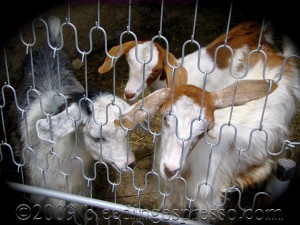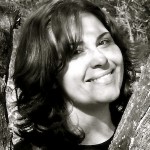Archive for 2009
Introducing Carmelina: Another Kid Joins the Herd
Today should rightfully be a Going Green post according to my schedule, but I’m under several deadlines and simply couldn’t do the planned topic of water conservation justice this week, so please try to suffer through these adorable photos of Carmelina, our newest kid, instead.
Yes, we have a new girl around here, this one via a friend of P’s who couldn’t keep her. Lucky us!
And in an interesting turn of events, the guy who originally had Carmelina (before P’s friend) seems to think she may already be carrying a new little kid or two. We have to get a blood test from the veterinarian to find out, but fingers crossed that there will be kids in a few months! Yay!
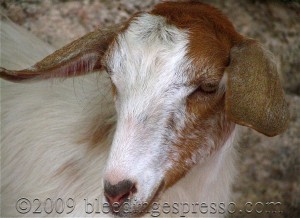 All the girls are getting along swimmingly and can often be found playing around and being silly with one another. I tried to get some video of their hijinks but my camera is acting up, jumping around, losing color, generally being disagreeable. I’ll keep trying though because it really is adorable to watch.
All the girls are getting along swimmingly and can often be found playing around and being silly with one another. I tried to get some video of their hijinks but my camera is acting up, jumping around, losing color, generally being disagreeable. I’ll keep trying though because it really is adorable to watch.
See more photos of the girls (and some other fun shots of our tomatoes, figs, grapes, a lone pomegranate that couldn’t, and more!) on my Flickr page–and feel free to friend me if you’ve got a Flickr account! That way you can always keep up with my latest photos, and I can keep an eye on yours as well.
Ah, and if you’re still in a goatish mood, check out this goat and dog pair that were wandering around Norristown, PA together (thanks Megan!). Too cute!
Buon weekend!
Oggi Sciopero!
Adesione all’appello di Diritto alla Rete contro il DDl Alfano che imbavaglia la Internet italiana.
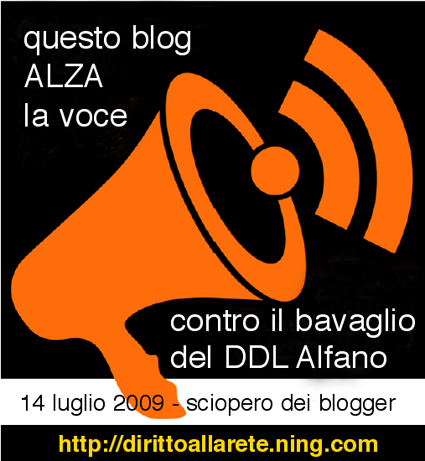
P.S. For those who don’t speak Italian but want to know what’s going on, there is an English explanation at Diritto alla Rete.
Bloggisti unite!
Winners of Travellers Calabria Guidebook & Calabrian CD by Marasà
I know you’re anxious, but for those who may not have seen all the great things leading up to today’s announcement, do check out the rest of the week’s posts:
- Kicking Off Travellers Calabria Week with Mimmo’s Music
- Q&A with Travel Writer Lara Dunston Part 1
- Part 2 of 5
- Part 3 of 5
- Part 4 of 5
- Part 5 of 5
Now let’s get to it!
The winner of the Calabrian CD by Marasà is Victor Cina aka @victorcina on Twitter (a great person to follow by the way)!
And the five winners of Travellers Calabria guidebooks are:
- Bonnie (Valentino’s Wife) of Amore e Sapore di Famiglia
- Ice Tea for Me
- Suzie of Palazzo Pizzo
- Sezzy
- Jo Tedesco of Santa Cristina D’Aspromonte
Most of these winners entered several times, including tweets and FB postings, so it does pay to be persistent! I will email all of you for your details, but if for some reason you don’t hear from me, feel free to send along your mailing address through Twitter, FB, or email michellefabio5(at)gmail(dot)com.
For those of you who would still like a copy of Travellers Calabria (as well you should!), you can purchase one via this special link through which I would get a small commission:

Thanks so much to everyone who read and commented and especially to Lara Dunston and Terry Carter not only for writing a fabulous guidebook about Calabria but also for being so available to talk about it and the business of travel writing.
Buon weekend a tutti!
Travellers Calabria Contest: Q and A with Travel Writer Lara Dunston Part 5 of 5
 Welcome to the final day of our Q and A with Travel Writer Lara Dunston! Previous installments:
Welcome to the final day of our Q and A with Travel Writer Lara Dunston! Previous installments:
Remember that I’m giving away FIVE copies of Lara and Terry Carter’s new guidebook, Travellers Calabria. See details here, but essentially you can comment every day this week for a chance to win Lara and Terry’s book.
And don’t forget to go back and comment on Sunday’s post for a chance to win a Calabrian CD by the group Marasà.
Hurry, today’s your last chance to comment on all the posts!
Now, the final part of my interview with Lara (all photos provided by Lara and Terry; remember you can hover over the photos for their descriptions):
9. Can you share some advice for aspiring travel writers?
Learn to write, learn to travel, and learn about people and places – these are the most important things.
Skills and qualities that come in handy are organizational abilities, especially trip planning, scheduling, budgeting and creating itineraries – you have to think of what you’re doing as a small business otherwise you’ll never be successful, time is money and all that; research skills, of course; language skills or an ability to mime and a mimic accents at least (!); and people skills, especially skills of diplomacy, because while most people you’ll deal with, especially those in hospitality, are absolutely delightful, you will meet the occasional jerk (trust me!).
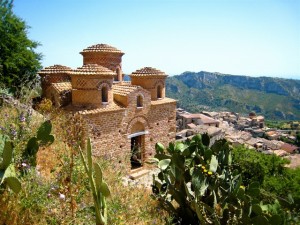 The most important qualities a writer needs to develop, however, is what I call skills of discernment, that is, the ability to judge whether a meal or restaurant is good or bad or why one hotel is better than another. This has nothing to do with taste, that is whether you like a place or not, but it has to do with form and function and all the many elements that comprise them, and you need to consider these things very objectively and critically.
The most important qualities a writer needs to develop, however, is what I call skills of discernment, that is, the ability to judge whether a meal or restaurant is good or bad or why one hotel is better than another. This has nothing to do with taste, that is whether you like a place or not, but it has to do with form and function and all the many elements that comprise them, and you need to consider these things very objectively and critically.
And then – yes, there’s more! – there’s a tonne of knowledge writers need to develop in all sorts of areas, from the travel industry and airlines and hotel companies, to transport and telecommunications and health and weather, to history and politics, arts and culture, archaeology and anthropology, food and wine, fashion and music, you name it!
You need to read as much as you can about a place before you go, while you’re there, and when you’re writing up, and that’s why research skills are so important.
I always encourage writers to hone their writing skills by using other quality pieces of writing as models to aspire to, whether it’s a longer magazine narrative piece or a guidebook you really liked. They should always keep the reader in mind – don’t write for yourself (so forget the corny jokes) but think about what it is that your reader wants from this text, do they want to be inspired, do they just want practical information? Some books require both.
You also need to learn to pitch, because it’s the pitches that get you the writing commissions in the first place. And there are certain etiquettes and protocols to learn, such as keeping in mind that editors, especially magazine editors, are very busy people, so take care when writing your pitches, don’t waste their time, think about what it is that they might need to know to make a decision as to whether they’re going to give you a story or not.
Develop a relationship and stay in touch but try not to be a pain in the butt by annoying them too much. Although to be honest, I often wonder how busy some editors really are, especially when on a Friday afternoon I get an email that ends with “have a good weekend” because they’re at least going to have a weekend – I’m not!
In this economic climate, I wouldn’t advise any aspiring writer to do what we did and quit their jobs and take to the road. It’s a tough time for the media and publishing industries, as it is for everyone.
 Terry and I no longer have a year’s worth of work lined up as we did for a few years running.Guidebook publishers are “slowing” their schedules, and books that aren’t bestsellers are getting “postponed”. Fees are also declining. Magazines and newspapers are cutting their freelance budgets, so that means they’re buying less content from writers who are in the field and more editors are writing stories researched from the desk.
Terry and I no longer have a year’s worth of work lined up as we did for a few years running.Guidebook publishers are “slowing” their schedules, and books that aren’t bestsellers are getting “postponed”. Fees are also declining. Magazines and newspapers are cutting their freelance budgets, so that means they’re buying less content from writers who are in the field and more editors are writing stories researched from the desk.
My advice would be to start to develop your portfolio while you have a more secure job or are freelancing in a more lucrative area, and don’t take the leap into full-time freelancing just yet, not until you have a portfolio of clips and you are on a roll and the offers are coming in.
On the other hand, I think there are a lot of opportunities in the digital feed, but unfortunately most simply don’t pay well enough, some pay well below the industry rate, and I don’t think anyone should be writing a thousand word story for $50!
10. What’s up next for you?
We’re in Mallorca now. I’m updating a book for AA Publishing and Terry has a huge photography contract, shooting pics for a few of AA’s Mallorca books. We’re hoping to take a couple of weeks off to spend in Barcelona and Madrid, two of our favorite cities in the world, and yet we’ve just realized we haven’t visited them in about six years!
Then we head to London for a few days, the Veneto for a few days, then Dubai, Syria for a magazine story and meetings about a book, then Thailand to do a book.
We’re currently developing a few books with a publisher on the UAE and Syria that we’re hoping will come off but it’s hard to get projects off the ground in this climate, so we’ll have to see where the work takes us next….
Well we can’t wait to follow you two.
Thanks so much for sharing such valuable information and insights with us, Lara!
Remember you can keep up with Lara on Twitter @laradunston and at her blog, Cool Travel Guide; Terry can be found @terencecarter on Twitter and at his blog Wide angles, wine and wanderlust.
Be sure to leave your comment and tweet or post to Facebook to maximize your chances of winning a copy of Travellers Calabria! See contest details here. Ends tonight!
Travellers Calabria Contest: Q and A with Travel Writer Lara Dunston Part 4 of 5
 Welcome to Day 4 of our Q and A with Travel Writer Lara Dunston! Previous installments:
Welcome to Day 4 of our Q and A with Travel Writer Lara Dunston! Previous installments:
Remember that I’m giving away FIVE copies of Lara and Terry Carter’s new guidebook, Travellers Calabria. See details here, but essentially you can comment every day this week for a chance to win Lara and Terry’s book.
And don’t forget to go back and comment on Sunday’s post for a chance to win a Calabrian CD by the group Marasà.
Now, my interview with Lara continues (all photos provided by Lara and Terry; remember you can hover over the photos for their descriptions):
7. Please help us live vicariously through you and walk us through your writing and research process for a guidebook.
If it’s a guidebook update, then the first thing we do is create an itinerary based on the content of the book.
If it’s a city guide and we’re renting an apartment in a city then we have to determine how we’re going to spend our days and nights for the next month or two so that we’re experiencing as many of the museums, sights, hotels, restaurants, bars, cafes etc as we can in the time available to do the research.
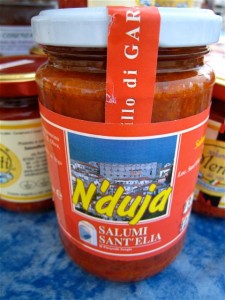 If it’s a country and regional guide, then we create an itinerary that gets us to those places in the most logical way.
If it’s a country and regional guide, then we create an itinerary that gets us to those places in the most logical way.
If they’re small towns we might only have enough time to spend a day and night. If they’re small cities obviously we try to stay longer, two or three days.
For big cities, we might stay weeks. For a city guide we might spend a month or two in that city. For the Australia book we recently did we were on the road for 5.5 months, and that was just the research part!
We always try to do everything and we do as much as we can – and we will phone places we can’t visit or places that are closed due to the season or they’re being renovated or whatever. Publishers simply don’t pay writers enough money to allow them sufficient time to do absolutely everything unfortunately.
When we’re doing the actual update of a book, we’re checking the accuracy of the existing text, of its practicalities, its facts and its overall description. We’re constantly asking ourselves if the place we’re visiting or thing we’re experiencing looks and feels the way it was described, and we’re changing the text accordingly.
We’re also assessing whether places are worth keeping in, and if they’re not and we’re planning to remove them, then we’re looking for new places to put in.
Writing first edition books are much harder of course – and the Calabria book was a first edition – because you’re gathering as much information as you can from a whole variety of sources and bringing that all together. You’re visiting places, writing down your observations, talking to people, writing notes, taking photos, and then sitting down and looking at all your research material and writing the whole book from scratch.
When I’m writing, I’m constantly referring to my notebooks and my photos (my photo galleries are essentially my memory!), but I’m also emailing people to ask extra questions I didn’t have time to at the time, I’m consulting history books, books on the politics and society of a place, or books written by locals that I might have picked up on the road.
I’m double-checking details on hotel and tourism websites, if it’s a place we might have had a few doubts about then I’m also looking at other reviews to find out what other people’s experience was – but we have enough experience now to know whether a hotel or restaurant was having a bad day or whether they have serious problems.
 Once we submit the manuscript then the editing process I touched on above begins and the editor sends back AQs (author queries). Some book publishers, such as DK, (as well as some magazines) also take the text through a further stage, the fact-checking process, as well, so you might have questions that also come from a fact-checker as well as the editor.
Once we submit the manuscript then the editing process I touched on above begins and the editor sends back AQs (author queries). Some book publishers, such as DK, (as well as some magazines) also take the text through a further stage, the fact-checking process, as well, so you might have questions that also come from a fact-checker as well as the editor.
8. What were your best and worst travel writing experiences?
The best far outweigh the worst, that’s for sure. They include any book we’ve written on Italy – and we’ve written books on various regions of Italy for Footprint, Thomas Cook and Lonely Planet – simply because we love Italy so much.
Other books that were great fun to research were the Buenos Aires guidebook we did for LP (we rented an apartment there for over two months and fell deeply in love with the city, so much so that we’re planning to buy an apartment there – we just need to find the time to get down there to do that!), and also books for LP on Amsterdam, and on Brussels Bruges Antwerp and Ghent. They were also cities we had been to and knew, but we really became very intimate with them writing books.
We spent a month in Thailand updating a book for DK and as I had to write a new spread on spas we got to try out an awful lot of spa treatments – so how can you complain about that?
I can’t recall a book experience being bad because of the place, but rather because of the circumstances. For instance, when editors send you to research books in Europe in summer – which they always seem to do – it’s the worst time because it’s not only expensive and hard to get rooms but it’s so hot that it’s doubly-exhausting running around checking stuff out.
Doing books on the road in Australia can be hard because of the poor telecommunications – so many motels in outback towns don’t have internet access or if they do, it’s dial-up, which we can’t use without accounts (we haven’t lived in Australia for 11 years).
While every town in Australia has phone access, once you’re out of those towns, there’s no signal, so you can’t use your mobile phone for many hours on the road when you could be making calls to check stuff, and that’s very frustrating.
In Australia, which is where we wrote our last books, we also had problems associated with horrific weather, we got caught in floods in Alice Springs, hurricane-like winds in southern Western Australia, heatwaves in South Australia, and bushfires in Victoria… all of these things delay research, which delays the amount of time you spend on the book, and the longer you work on the book, the less money you ultimately make in the long run.
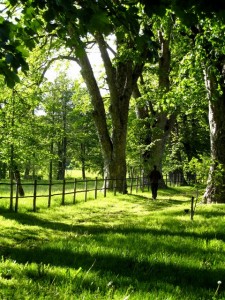 And some editors have no concept of how long it takes to research a place – they don’t add up the miles and think things through. I remember asking one editor how long the writer took to research a chapter and she told me – well, it took us twice as long, and we were often driving between 500-700 kms a day! It would have been physically impossible to do it in the amount of time the previous writer did it – they obviously skipped a lot of places!
And some editors have no concept of how long it takes to research a place – they don’t add up the miles and think things through. I remember asking one editor how long the writer took to research a chapter and she told me – well, it took us twice as long, and we were often driving between 500-700 kms a day! It would have been physically impossible to do it in the amount of time the previous writer did it – they obviously skipped a lot of places!
Probably the worst experience for me was Greece for Lonely Planet, and not at all because of Greece – or Lonely Planet – but we were in Thessaloniki and we were just about to pick up a hire car to embark on a six week research trip around the mainland and Peloponnese when my sister called from Australia to say my mum had been hit by a car and was in a critical condition and in a coma.
Terry immediately contacted Lonely Planet and they were understanding and said go and take as long as we needed. We were very lucky and we were able to get on flights from Thessaloniki to Athens that morning, then Athens to Dubai in the afternoon, then Dubai to Perth the next day, and I was in intensive care with my mother 24 hours later. Once my mother was out of danger, albeit still in a coma, a couple of weeks later, we were driving around Greece updating the book.
That was the hardest book I’d ever had to do because I was constantly thinking about her, but at the same time we couldn’t let LP down, especially as they’d been so understanding, and Terry couldn’t do it on his own. My Mum ended up being okay, although she lost an eye and most of the use of an arm and still has difficulty walking, and had she have died while I was driving around Greece, I probably would have died.
Something aspiring writers need to keep in mind is that the most difficult thing about being a freelancer is that you don’t get sick leave, annual leave or compassionate leave, and you don’t always have sympathetic publishers.
We wrote and updated 25 books for Lonely Planet and while I am no great fan of theirs, especially now that they’re largely much owned by the BBC, they were very understanding and could be very good about how they treated their writers when it came to things like that.
That can’t be said about all publishers so writers need to carefully pick and choose who they want to work with, but of course you can’t know until you’ve worked for them. And I’m sure some publishers feel the same about writers!
How cool is this inside look into travel writing?
Be sure to come back tomorrow for the final installment, which will include Lara’s excellent advie to all you aspiring travel writers out there.
Be sure to leave your comment and tweet or post to Facebook to maximize your chances of winning a copy of Travellers Calabria! See contest details here.

